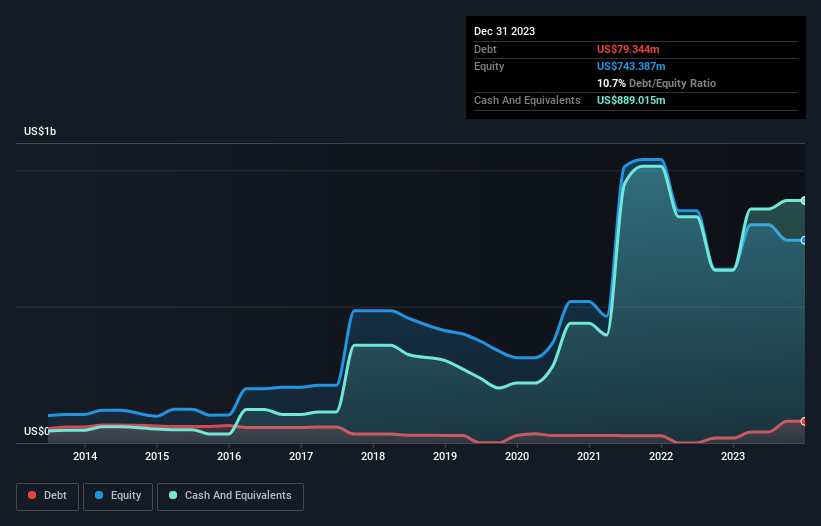
The external fund manager backed by Berkshire Hathaway's Charlie Munger, Li Lu, makes no bones about it when he says 'The biggest investment risk is not the volatility of prices, but whether you will suffer a permanent loss of capital.' It's only natural to consider a company's balance sheet when you examine how risky it is, since debt is often involved when a business collapses. As with many other companies HUTCHMED (China) Limited (LON:HCM) makes use of debt. But is this debt a concern to shareholders?
What Risk Does Debt Bring?
Generally speaking, debt only becomes a real problem when a company can't easily pay it off, either by raising capital or with its own cash flow. In the worst case scenario, a company can go bankrupt if it cannot pay its creditors. However, a more frequent (but still costly) occurrence is where a company must issue shares at bargain-basement prices, permanently diluting shareholders, just to shore up its balance sheet. Of course, the upside of debt is that it often represents cheap capital, especially when it replaces dilution in a company with the ability to reinvest at high rates of return. When we think about a company's use of debt, we first look at cash and debt together.
View our latest analysis for HUTCHMED (China)
What Is HUTCHMED (China)'s Net Debt?
You can click the graphic below for the historical numbers, but it shows that as of December 2023 HUTCHMED (China) had US$79.3m of debt, an increase on US$18.1m, over one year. But on the other hand it also has US$889.0m in cash, leading to a US$809.7m net cash position.

A Look At HUTCHMED (China)'s Liabilities
According to the last reported balance sheet, HUTCHMED (China) had liabilities of US$403.0m due within 12 months, and liabilities of US$133.4m due beyond 12 months. Offsetting these obligations, it had cash of US$889.0m as well as receivables valued at US$150.5m due within 12 months. So it actually has US$503.1m more liquid assets than total liabilities.
This excess liquidity suggests that HUTCHMED (China) is taking a careful approach to debt. Given it has easily adequate short term liquidity, we don't think it will have any issues with its lenders. Simply put, the fact that HUTCHMED (China) has more cash than debt is arguably a good indication that it can manage its debt safely.
Although HUTCHMED (China) made a loss at the EBIT level, last year, it was also good to see that it generated US$18m in EBIT over the last twelve months. The balance sheet is clearly the area to focus on when you are analysing debt. But ultimately the future profitability of the business will decide if HUTCHMED (China) can strengthen its balance sheet over time. So if you want to see what the professionals think, you might find this free report on analyst profit forecasts to be interesting.
Finally, a business needs free cash flow to pay off debt; accounting profits just don't cut it. HUTCHMED (China) may have net cash on the balance sheet, but it is still interesting to look at how well the business converts its earnings before interest and tax (EBIT) to free cash flow, because that will influence both its need for, and its capacity to manage debt. Happily for any shareholders, HUTCHMED (China) actually produced more free cash flow than EBIT over the last year. That sort of strong cash conversion gets us as excited as the crowd when the beat drops at a Daft Punk concert.
Summing Up
While we empathize with investors who find debt concerning, you should keep in mind that HUTCHMED (China) has net cash of US$809.7m, as well as more liquid assets than liabilities. The cherry on top was that in converted 1,016% of that EBIT to free cash flow, bringing in US$187m. So we don't think HUTCHMED (China)'s use of debt is risky. There's no doubt that we learn most about debt from the balance sheet. However, not all investment risk resides within the balance sheet - far from it. We've identified 1 warning sign with HUTCHMED (China) , and understanding them should be part of your investment process.
When all is said and done, sometimes its easier to focus on companies that don't even need debt. Readers can access a list of growth stocks with zero net debt 100% free, right now.
Valuation is complex, but we're here to simplify it.
Discover if HUTCHMED (China) might be undervalued or overvalued with our detailed analysis, featuring fair value estimates, potential risks, dividends, insider trades, and its financial condition.
Access Free AnalysisHave feedback on this article? Concerned about the content? Get in touch with us directly. Alternatively, email editorial-team (at) simplywallst.com.
This article by Simply Wall St is general in nature. We provide commentary based on historical data and analyst forecasts only using an unbiased methodology and our articles are not intended to be financial advice. It does not constitute a recommendation to buy or sell any stock, and does not take account of your objectives, or your financial situation. We aim to bring you long-term focused analysis driven by fundamental data. Note that our analysis may not factor in the latest price-sensitive company announcements or qualitative material. Simply Wall St has no position in any stocks mentioned.
About AIM:HCM
HUTCHMED (China)
HUTCHMED (China) Limited, together with its subsidiaries, discovers, develops, and commercializes targeted therapeutics and immunotherapies for cancer and immunological diseases in Hong Kong and internationally.
Reasonable growth potential with adequate balance sheet.
Market Insights
Community Narratives




